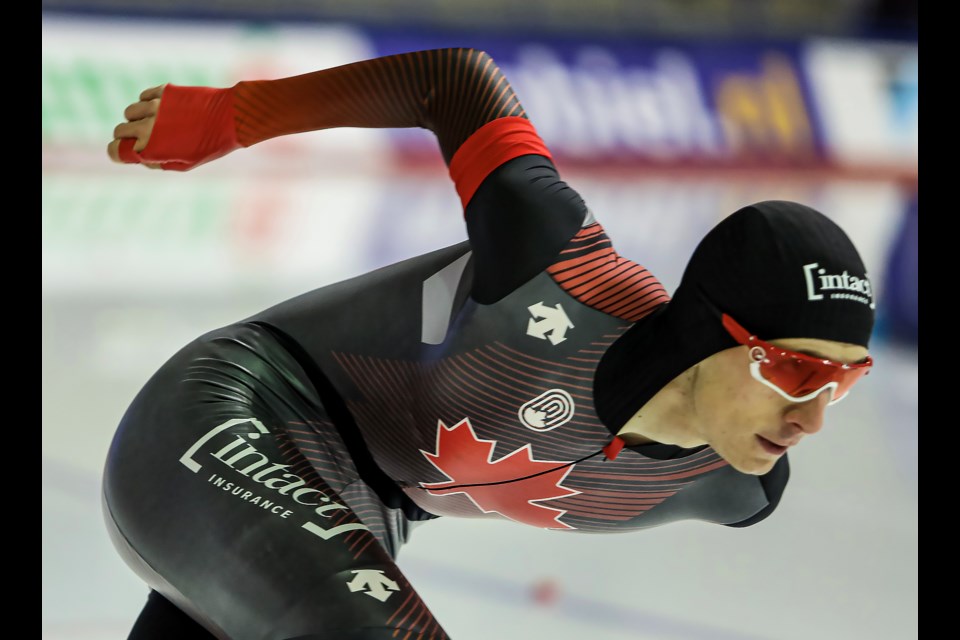HEERENVEEN, Netherlands – Canadian speed skaters hopped on a new trend in team pursuit and the gamble paid off big.
Shunning traditional wisdom, Canmore’s Connor Howe led from start to finish in Team Canada’s silver medal performance in men's team pursuit at the year-end 2023 ISU World Speed Skating Championships in long track from March 2-5 in Heerenveen, the Netherlands.
Howe, Antoine Gélinas-Beaulieu and Hayden Mayeur crossed the finish line at a time of 3:38.43 – barely beaten by their gold medal winning Dutch rivals by a mere 0.17 seconds.
“We thought we had it, but it was really close,” said Howe, 22.
In past years of speed skating, a trio skating in single file exchanged leads throughout the race’s eight laps (3,200 metres). However, following the lead of several nations from one year ago at the Beijing Games, the Canadians switched their philosophy on team pursuit and went younger, faster, and handed the reins to just one athlete to lead from start to finish.
It’s a technique Canada implemented all season and on Sunday (March 5), they nailed it.
“It took a bit of adjustment, I think, but the front guy just has to rely on the back two to almost push him on after four or five laps when it starts getting hard to maintain that speed. I think we’re getting into it,” said Howe.
Speed Skating Canada coach Bart Schouten predicts that team pursuit will be even faster at the 2026 Winter Olympics, which prompted them to also move in the direction of faster middle distance skaters, like Howe, as opposed to longer distance skaters.
“We haven’t really medalled [in team pursuit] in a while, so it was a super strong performance by Connor, really good,” said Schouten.
“As our lead out skater, he’s shown that he’s really capable of leading the team and executing a great race for the other guys, we really found out that this year that he's capable of doing that.”
Howe started the post-Olympic season with a focus on individual racing as he geared up for All Arounds in two years. One of the races he tested out included the mass start, in which the Canmore skier instantly became the national champion last October. He holds the national 1,500-m title as well.
The mass start involves two races – a qualification and final. On the international scene, Howe’s biggest result was a world cup silver in Calgary. Although, he fell short at world champs, in 14th place.
In Howe’s final race at the world championships, the highly anticipated 1,500-m had a lot of extra buzz. In the final pairing, Howe, who finished this season as the No. 2 overall 1,500-m long track speed skater in the world matched up against, guess who, the top dog and No. 1 guy, Kjeld Nuis.
It was the first time all season long the top two skaters paired against each other. In the race, each vied to overthrow USA’s Jordan Stolz first-place slot, and the 12,000 people in attendance at the Heerenveen oval let the athletes know exactly what they thought about it.
“In the race, you could hear the crowd. It was hard on my hearing, like, it was so loud in there,” said Howe.
Earlier in the season, Howe had dominated the 1,500-m, winning gold and silver medals at the first two world cups. It was only at the final world cup in February that the Olympic champion Nuis surpassed Howe and claimed the top overall marker.
The world championship scene got even more electricity added to it when Darth Vader’s theme music started playing as Howe and Nuis were introduced on the start line.
However, the heavyweight bout lacked an epic lightsaber showdown between the Dutchman and Canuck. Fatigue caught up to Howe as Nuis easily won the pairing and claimed silver at a time of 1:43.82 – 0.23 seconds behind the new world champion Stolz. The Canmorite finished 10th at 1:45.52.
“I was hoping I could do a more competitive one, but it didn’t quite come,” said Howe.
“It seems my peak was around November to December, and then that gap between racing, I didn’t really get it back, like, the 1,500 feel.”
Schouten said he thinks the three races Howe competed in prior – two mass starts and team pursuit – affected his pupil.
“I don’t think it was he peaked early in the season or burnt out by the end,” said Schouten. “I do think the third day of racing was a little too much. The [two] mass start races and team pursuit were very hard.”
Schouten expects things to change next season for Howe.
This season, the 22-year-old from Canmore expanded his race repertoire and experimented with races he hadn’t delved too deep into. Howe thinks he’ll have to re-evaluate next season and “pick and choose what I do more carefully”.
“The 1,500 metres was a little disappointing and we see that too, so we’ll have to think about the strategy for next year and what races will be his priorities," said Schouten.
However, the coach added that this season confirmed that Howe is among the world's elite.
“It’s always hard sometimes to repeat a breakout season,” said Schouten. “Skaters question a little bit if they can do that or repeat if it was just a one-year fluke but Connor has proven that he’s consistently a top contender in that 1,500 metres, and, the other thing I think is super interesting is he’s really shown he’s a good skater in the team pursuit.”




